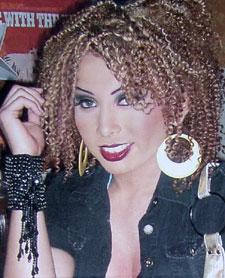A last-minute bid to allow Church St regular Victor Alex Chay Rodriguez to stay in Canada has failed. Rodriguez was returned to Mexico on Oct 25.
“We tried to stop the deportation,” says friend David Garcia. “The lawyer sent the deferral request [on Oct 23] and a few hours later the immigration officer sent a negative response.
“It was very sad and I’m very depressed. I feel defeated.”
Garcia, a former president of the queer Latino group Hola, was one of a group of friends who sprung into action after Rodriguez was detained by immigration officials on Oct 19 on his way home from Church St, where he performed regularly as his drag persona Zuleyka.
“He was arrested after performing at George’s Play while walking home with a bunch of queens on Maitland,” says Garcia. “They were just walking and going home, they weren’t working… in prostitution. A car approached and the two officers went directly to Zuleyka.
“It was very sad, he was detained dressed up. A friend took some clothes to the detention centre so he could change, but that’s a little degrading to be put into the general male population like that.”
Although the 20-year-old man had been living illegally after being denied refugee status, Garcia says he’d hoped Rodriguez would be given another chance to show that he should be allowed to stay in the country on the grounds that his HIV-positive status would put him at risk in Mexico.
“We got a letter from Alex’s doctor,” says Garcia. “That letter was so clear and direct, that Alex was already on a particular treatment and that there was no guarantee that he would get the medication he needs. The letter from his doctor stated that he could die within the year without the right medication. We were optimistic that we could retain him based on that detail.”
Garcia says he’s worried about Rodriguez, who came to Canada with his family when he was just 16. “He’s going to start a new life, restart his life and hopefully he’ll be okay. He has medication for a month so in a month he’ll have to start a new treatment.”
Garcia says that Rodriguez is now hoping to study to be an aesthetician. “He’s trying to go back to school to study makeup and hair styling. There’s hope for him. He has family there. He’s lucky. He’s young.”
But he notes that Mexico is not as safe for queers as Canadian tourists might think from their vacation experiences.
“It’s so full of contradictions because it’s true, you can go and have a great time and enjoy yourself peacefully in tourist areas,” says Garcia. “But if you’re living in Mexico as a Mexican it’s a whole other story.
“People talk about gay and lesbian equality but there is hypocrisy and in the end they don’t respect it. You can get killed. How can immigration not understand what we’re talking about?”
He adds that Rodriguez’s case should be a wakeup call to the Latino community in Toronto and particularly to those with cases pending in the immigration and refugee system.
“Latino people in immigration situations who are waiting for responses for humanitarian and compassionate grounds, they don’t always understand how the system works. When you don’t follow the procedure, you get sent a deportation order to arrest you. But they don’t about the legal system, they don’t speak the language. They’re so frozen that they don’t know what to do, they make mistakes.
“We’re talking about preparing a strategy for these situations. What would we do in a similar case where they were sending back a guy who could die without HIV medication? That means more work…. We have to take steps. We have to educate our people.”

 Why you can trust Xtra
Why you can trust Xtra


